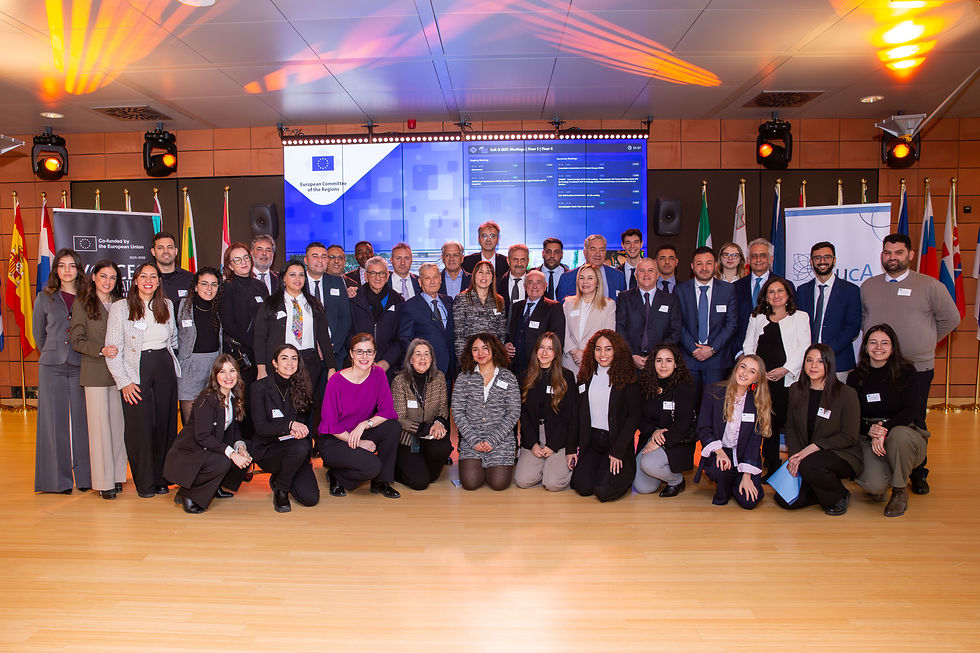VOICES From Migrations | Mohamadou Balde's story
- Changemakers
- Oct 6, 2025
- 3 min read
“VOICES From Migrations” is a project co-funded by the European Union exploring untold migration stories. Mohamadou Balde is originally from Senegal and arrived in Italy in 2014. This is his story:

“My name is Mohamadou Balde, I come from Senegal, and I am 32 years old. I have been living in Italy since November 2014, and since I arrived here, I feel more responsible.
My life in Senegal was very difficult. My family still lives there. Unfortunately, my father is no longer with us, but I still have my mother, as well as a wife and a beautiful son. I also have four brothers in Senegal.
I decided to come to Italy after my father died — he was actually the one who encouraged me to make the journey. I came here on a boat from Libya, along with many other Africans like me. I didn’t know anyone when I landed in Italy.
I first arrived in Lampedusa and then was moved to a refugee camp in Caserta, which I left in 2016 because I didn’t have a residence permit. Later, I went to Foggia, where I lived in a shantytown. I stayed there until 2017, the year I arrived in Rosarno.
After obtaining a six-month hospitality permit that allowed me to work, I found seasonal jobs in the tomato and asparagus fields, and here in Rosarno, in the mandarin fields. In 2021, I also found work in Spilinga, and now I live in the tent city of San Ferdinando.
There have been some difficult moments here in Italy, especially dealing with bureaucracy around the hospitality permit. The same issue with renewing my identity documents kept coming up every six months.
The people who helped me the most in Italy were my African friends and those who helped me find work. I’m also grateful to the Municipality of San Ferdinando, which provided me with housing and a small job.
I’m still in contact with my family in Senegal, and I truly hope to return one day to my home country.”
Interview by: Simone Cerino, Ekaterina Dyachkova Shamshina, Joaquín Emiliano Espinoza Castro, Marco D'Agostino, and Maria Irene Mustica
Original story in Italian:
“Mi chiamo Mohamadou Balde, vengo dal Senegal e ho 32 anni. Vivo in Italia dal mese di novembre 2014 e da quando sono arrivato qui mi sento più responsabile.
La mia vita in Senegal era molto difficile e la mia famiglia tuttora vive lì. Purtroppo, mio padre non c’è più ma fortunatamente ho ancora mia madre con me, e anche una moglie con un figlio bellissimo. In Senegal ho anche quattro fratelli.
Ho deciso di venire qui in Italia dopo che mio padre è morto, tanto che è stato lui stesso a consigliarmi di venire. Sono venuto qui partendo con un barcone dalla Libia, insieme a tanti africani come me. Non conoscevo nessuno quando sono sbarcato qui in Italia.
Sono arrivato prima a Lampedusa e poi in un campo profughi a Caserta, che ho lasciato nel 2016 perché non avevo il permesso di soggiorno. Successivamente sono andato a Foggia, dove vivevo in una baraccopoli. Qui sono stato fino al 2017, anno in cui sono arrivato a Rosarno.
Dopo aver preso il permesso di ospitalità di 6 mesi, valido per lavorare, ho trovato dei lavoretti stagionali nei campi di pomodori, di asparagi e, qui a Rosarno, di mandarini. Nel 2021 ho trovato anche un lavoro a Spilinga e ora vivo nella tendopoli di San Ferdinando.
Qui in Italia ci sono stati alcuni momenti difficili, come ad esempio quelli burocratici che riguardavano il permesso di ospitalità, perché ogni sei mesi si ripeteva sempre lo stesso problema per il rinnovo dei documenti d’identità.
Le persone che mi hanno aiutato di più in Italia sono stati i miei amici africani e anche quelli che mi hanno aiutato a trovare lavoro. Sono grato anche al Comune di San Ferdinando, perché mi ha dato un alloggio e anche un piccolo lavoro.
Sono ancora in contatto con la famiglia in Senegal, e spero con tutto il cuore di ritornare un giorno nel mio paese d’origine.”
Intervista di: Simone Cerino, Ekaterina Dyachkova Shamshina, Joaquín Emiliano Espinoza Castro, Marco D'Agostino, e Maria Irene Mustica

Funded by the European Union. Views and opinions expressed are however those of the author(s) only and do not necessarily reflect those of the European Union or the European Education and Culture Executive Agency (EACEA). Neither the European Union nor EACEA can be held responsible for them.



Comments